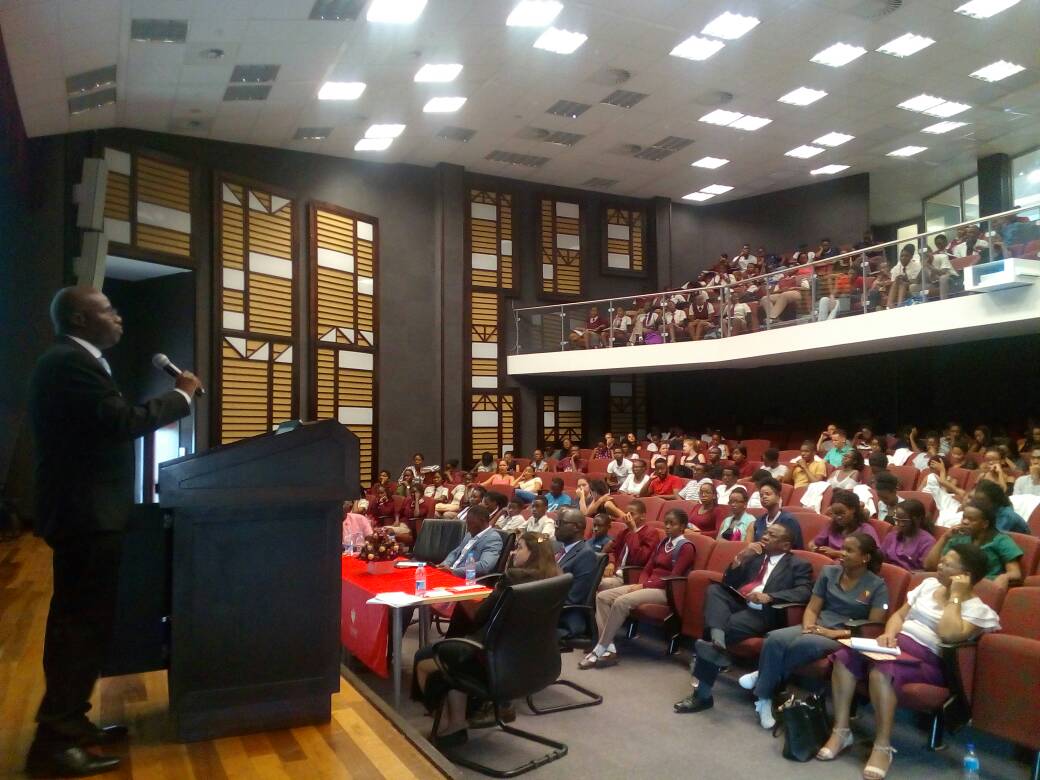
The SIAPS Namibia Project Director, Dr. Evans Sagwa, has advocated for adoption of strategies to ensure drug safety in TB and HIV treatment programs in the country. He made this call while delivering a public lecture on Friday, September 22, 2017, entitled “Strategies for optimizing patient safety in HIV and TB treatment programs in Namibia,” to more than 300 people at the University of Namibia’s (UNAM) School of Medicine. The audience included UNAM academic staff, health care workers, and pharmacy and medical students. Dr. Sagwa emphasized that strategies, such as the close clinical monitoring of patients on treatment, active surveillance of newly introduced medicines, use of routinely collected clinical data, and educating and involving patients in their treatment, could ensure medicine safety in patients.
Dr. Sagwa was among the five eminent speakers who delivered lectures to the audience, under the broad theme “Ending the HIV/TB Epidemic: Update on the Namibia Situation.” The other speakers included Dr. Simon Agolory, the Country Director for the US Centers for Disease Control and Prevention (CDC) and Professor Gunar Gunther of the Namibian Ministry of Health and Social Services.
In his lecture, Dr. Sagwa stressed the importance of medicine safety in the HIV and TB treatment programs, considering that up to 90% of patients may suffer mild-to-life threatening adverse events, such as permanent hearing loss or liver or kidney damage. Failure to ensure drug safety, added Dr. Sagwa, could potentially result in disruptions in adherence to treatment, deaths, and escalated costs for patients that have to change medicines.
According to 2015 statistics, Namibia is among 30 high-burden countries, recording 12,000 new TB cases every year. With a prevalence rate of 489 per 100,000, TB is a major public health problem in the country. Although there is gradual decline of TB cases according to Professor Gunther, 3.9% of all new TB cases have MDR-TB, whereas 7–8% of old cases are diagnosed with MDR-TB. Presently, 14 patients are undergoing XDR-TB treatment at a referral hospital in Namibia’s capital city, Windhoek.
Other topics on discussion during the lecture specific to the context of Namibia included an update on HIV, MDR-TB, genotyping HIV and TB to detect drug resistance, and exposure of health workers to HIV.
In his remarks, the Dean of the Faculty of Health Sciences, Professor Peter Nyarang’o, thanked USAID for supporting the UNAM School of Pharmacy (SOP) through the Systems for Improved Access to Pharmaceuticals and Services (SIAPS) Program and other projects implemented by Management Sciences for Health (MSH). SIAPS has supported the UNAM SOP in the long-term planning, training, and assessment of pharmaceutical human resources and building the capacity of the institution to provide pre- and in-service pharmaceutical management training.

